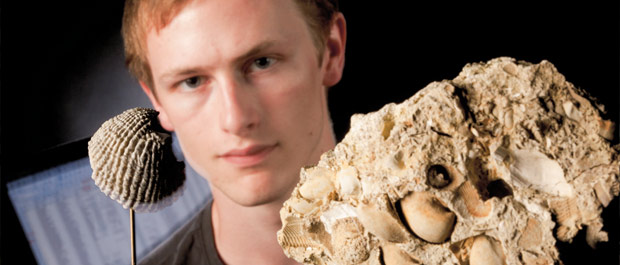Growing up in Canton, Georgia, Ken Hoehn wasn’t exactly encouraged to study the science of evolution. “The community I grew up in was very Christian-conservative, so evolutionary theory was one of those forbidden fruits,” says Hoehn, who first was drawn to science by collecting insects as a boy. “But I was always curious about it.”
At Duke, that curiosity has blossomed into a driving passion. An A.B. Duke Scholar who already has published in a scientific journal, Hoehn is spending the summer before his senior year working on two separate research projects related to evolution. In one, he is working with Mohamed Noor, professor and associate chair of biology, to try to understand the effect of a certain genetic mutation on the evolution of fruit flies. For that project, he’s studying the genomes of multiple species of fruit flies to trace the evolution of the mutation.
Ken Hoehn '13
Major: Biology
Hometown: Canton, Georgia
When he’s not combing through fruit-fly genomes, he’s thinking about fossils from the dinosaur era. His other summer work involves trying to develop new statistical techniques to study levels of natural selection during mass extinctions, like the one that wiped out the dinosaurs 65 million years ago. The project grew out of an assignment for a macroevolution class, but its roots go back further into Hoehn’s past.
“Levels of selection is a big topic within evolutionary theory.… I was reading some of the literature on it before I even got to Duke,” he says. “I am now bringing [my project] to be where I think it could be relatively influential.”
Hoehn says he decided to pursue computational biology rather than a premed curriculum, in part, because “I just didn’t particularly like studying people.” But he learned early on that lab research can still be full of human emotions. During his freshman year, he spent a couple of hours every other morning in Noor’s lab watching flies mate and gathering data. After months of this routine, he found out the flies were contaminated—and thus all the data he’d collected was useless.
“One of the biggest characteristics [of a good researcher] is just tolerance of frustration,” Hoehn says. “A lot of times projects just don’t work.”

Share your comments
Have an account?
Sign in to commentNo Account?
Email the editor